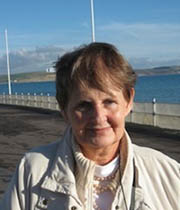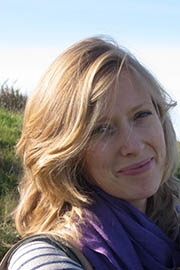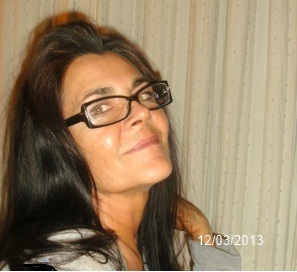We are delighted to announce the Winner of the 2013 Cafe Writers Open Poetry Competition, judged by Deryn Rees-Jones is Judy Brown with her poem King Tak Hong Porcelain, Queens Road East, Wanchai.
Deryn Rees-Jones writes:
Being the reader of 1659 poems is not an undaunting process. There is always the risk of becoming snow-blind in the face of so many words. Each poem potentially opens a window to a person’s life. Each poem insists on a conversation. But the best of the poems submitted to this competition — many more than the eleven poems that I eventually chose as winners — managed not only to beckon and beguile, but also, when returned to after a while, had the ability to please and surprise all over again. And this is the hallmark of all the poems I eventually chose as winners: poems that made me suddenly alert to a feeling or a thought or an experience, or sometimes all three; these were poems which allowed me to travel with and through those thoughts and feelings; poems written with a musicality that worked to ensure that when returned to each poem remained fresh.
Judy Brown’s winning poem insisted on being read and re-read and yielded more on each occasion. It’s bold to simply state wants and needs in a poem; especially when suddenly, in stanza three, the demand is for ‘fifteen years of my life back’. The end of the poem, as cool and bare-faced as the seduction it is remembering, sits beautifully alongside desire and bric a brac. Alison Falconer’s poem ‘You’d Think by Now’ was a perfectly made lyric. At thirteen lines it’s what I think of as a ‘disappointed sonnet’; the melancholy of its subject matter (our choosing of the wrong loves over the right), beautifully played with the half-rhyme that sits across its ending. Other poems that didn’t quite make it into the final few included the surreal ‘Hitchhike with Horse’ [Ira Lightman] and ‘Lost Songs’ [David Grubb] which nevertheless managed to get under my skin and demand tough calls. A judge’s choice is always a personal choice; taste can feel arbitrary. But I feel confident that anyone reading these poems will take pleasure in the way each of them asks us to look and think and look and yes…..listen again.
King Tak Hong Porcelain, Queens Road East, Wanchai
I wanted the pottery pumpkin, ten-lobed
in yellow, red and green.
I wanted to sit at home on the barrel stool
with its wraparound blue mountains
I would have wanted the dragon cake-stand
if it hadn’t had a gold edge.
I needed dishes for earrings and soy-sauce
half a dozen lids to hold my tea’s heat.
I wanted the soap-green plastic coat-hangers
with the swivel hook, plus pencil pots
brushed with wrist-flicky crustaceans, waving
their one-stroke feelers under glaze.
I wanted fifteen years of my life back,
to start here again, bone-china skinned
and mouthy, a pale flag of sweat drawing down
the neon blaze of the Cup Noodle Building
onto my skinny chest. I wanted the slowed replay,
to share it with you once over.
My wish list: our first date in the hardware shop.
(I’ve kept both of the green mugs
now full of sensitive toothbrushes and floss);
some other things I’ve thought better of since;
most of all that night-long bare-faced seduction
under the cool eyes of your tropical fish.
Judy Brown‘s first collection Loudness (Seren, 2011) was shortlisted for the 2011 Forward/Felix Dennis and 2012 Fenton Aldeburgh first collection prizes. She was Poet in Residence for 2013 at the Wordsworth Trust, Dove Cottage, and in June 2014 will be writer in residence at Gladstone’s Library, Flintshire. She won the Manchester Poetry Prize in 2010. Judy lives in Derbyshire.
Second Prize goes to Paul Stephenson for Round the Block
Round the Block
My default was anti-clockwise:
fourteen minutes on go-slow
but under ten when legging it.
Straight down the crazy paving
and first base the Post Office
to check on ads for babysitting,
past the village Memorial Hall
where they held the whist, bingo,
fête, fruit and vegetable show,
then the Blue Seat by the nettles
at the far edge of the rec’ and
in through the heavy latch gate,
passing alongside Grandad who
loved his jazz, a quick squizz
for fresh-dug mounds of earth
and flowers among the molehills,
loping the loud gravel sloping
entrance of St. Nicholas’ church
and out at the Old People’s Flats,
taking in Whitethorn’s dark thatch,
peering into the Victorian primary
school, Mr. Lamper’s junior class,
skirting the fence at Mrs. Bulgar’s,
always ninety-three or ninety-four,
to Oulton House and Iceni Cottage,
the slide, the swings and roundabout,
not forgetting the short dinner lady’s
wonky table of pickles and chutneys,
her deck chair and rattling jam jar,
curving left at the grass triangle
that gave distances to next places,
clocking the carved wooden sign
with its hare and pheasant staring
out against the cornfield relief
each side of Queen Wilburga,
and further, back to the Roman
Road, Butt Lane, mud and cow
parsley running wild for miles,
to catch Dad standing there,
the tan leather of the leash
dangling, the dog long gone.
Paul Stephenson has published poems in magazines including Poetry London, The North, The Wolf, Smiths Knoll and Brittle Star. He recently won the South Bank Poetry competition, and previously came first in the Magma Editor’s prize and second in the Troubadour International Poetry Prize. He is currently taking part in the Jerwood/Arvon mentoring scheme 2013/14. Originally from Cambridge, he studied modern languages. Paul is a university teacher/researcher and at present lives between London and Paris.
Third Prize goes to Lucy Maxwell Scott – for Arnolfini wedding reflection
Arnolfini wedding reflection
They are damned before they begin.
You can see it in the pinched aspect
of his face, the limpness of his hand
holding hers, the way he averts his gaze.
There is a meanness
in her husband that he hides through displays
of wealth, by draping her in yards of cloth
from his own shop, choosing the green
of the dress bunched round her waist
as though the swell contains
the baby they long for but will never possess.
She does not have much time
and if you look you can see the lack of bloom
that’s more than just a lack of sun
in their bedroom. He could be her twin,
the set of him, the slimness of their hands
and in years to come they will be endowed,
mistakenly, with the same name, Giovanni
e Giovanna. I have seen it and right now
I hold the artist in miniature,
forever in my eye. He shows these things
in the pallor of her skin, the gentleness of line
for one who is more robust in the flesh. He aspires
to capture them in pigment not from the impulse
to create but from the dizzying fear
of the smallness of his life.
And so he immortalizes it all;
the necessary dog, the wayward shoes,
the dark red of the marriage bed,
and me, here on the wall, seeing everything.
Lucy Maxwell Scott grew up believing she was the reincarnation of her ancestor, Sir Walter Scott, and is drawn to graveyards and railway stations. She studied English at Oxford many years ago and Creative Writing at Bath Spa more recently. She writes poetry and short stories and has completed one and a half novels. In 2013 she was shortlisted for the Bridport poetry competition and commended for a short story, Misappropriation, in the 2013 Fish International Anthology. She currently lives in Wiltshire and works in the voluntary sector
The Norfolk Prize goes to Alison Falconer – for You’d think By Now
You’d think by now..
So many times we choose wrong loves
And miss the right,
You’d think by now we would have learnt,
For evolution’s sake,
To call, like whales, across the seas for our soul mates,
And grown an inner ear with pitch minutely tuned for
Just the calls
Of those whose souls would make ours soar.
And those whose souls would chip and grind
And wear each other down
Would pass like whalers on the main
And never know
How close disaster came.
Alison Falconer has lived in Norfolk for the last 20 years and studied for an MA in Scriptwriting at the University of East Anglia. She has only recently started writing poetry after half a lifetime of reading and enjoying other people’s. She is, however, the author of two non-fiction books and a commissioned playwright for radio and stage. Her dissertation play, Prosperity 3, was long-listed for the Kings Cross New Writing award.
The Funniest Poem prize went to Josh Ekroy for Workshop
Workshop
This is a lovely poem, John, beautiful and so tender.
It’s what I call high risk because nightingale poems
are two a penny, you might want to read Samuel’s
and William’s. Now: you should look at lineation,
syntax, metre and rhyme and then rewrite either as a
sestina or you can revert to the form you have
but in reverse order? Do you see what I mean? So then
you wouldn’t have that very very long sentence at the start
– and by the way, can numbness pain? I don’t think
you need “sense” in that sense, do you? Hemlock
might be alright for Socrates but here? I’m not sure.
I would do more research into poisons if I were you.
“Some dull opiate” is terribly vague and “one minute
past” what exactly? “Lethewards” is a coinage of course
but I don’t think it quite comes off, it’s as if you’ve just
thought of it for convenience’s sake and thought well,
I’ll just put that in, you know? “Sunk” and “drunk” is
literally a clunky rhyme, can’t you think of a better one
at this point? Do have a try, John, because as I say
it’s a lovely poem and deserves something better.
Now, “tis not through envy” all the way down to “ease”
needs to go. “Beechen” is there for the metre but
it’s archaic. Think of some other tree if you can.
Can you, John dear? Now,
stanza two. Dear me, this is going to take a long time,
yes, you others, do go if you have to. “Oh for a beakerful”
is that a toothmug? I do wonder what it’s doing in a
beautiful poem about a nightingale. Hippocrene
has no place in contemporary poetry unless it’s ironic?
It is blushful after all and has nothing to do with toothmugs.
“A long age” won’t do, your wine will turn to vinegar,
think about how long you want your wine to have been
kept, John. Now the second half of that stanza merely
repeats the first half so get rid of it and go straight into
stanza three which is fine except for a “few sad last grey
hairs,” you can’t have five monosyllables all together
like that, John. John? Are you still with me? John…?
Josh Ekroy‘s poems appear in Magma, Poetry Ireland Review, Rialto, The SHOp, Acumen, and others. He won third prize in the Keats-Shelley competition. He is in The Best of British Poetry 2011 (Salt) and The Stony Thursday Book, 2013, and has a collection of war poems, Ways To Build A Roadblock, appearing in May 2014 (Nine Arches Press)
There are six Commended poems this year:
U.S. born Wendy Klein has lived in England most of her adult life. Published in many magazines and anthologies, she has had two collections from Cinnamon Press: Cuba in the Blood (2009) and Anything in Turquoise (2013). This is her poem:
Tisch
You should say it like shhhh, the sound
you make to quiet a fractious child,
and understand it is a word with substance
before you find out what it means.
The upper-case ‘T’ tells you that it is a noun,
and you will want to reach out to touch it –
to find out what it is made from: solid oak,
birds-eye maple, reinforced glass
that won’t even shatter if Vati drops his Beer
Stein on it, if Mutti slams her fist
down on it too hard when little Max won’t eat
his Wiener Schnitzel because of the poor calf.
You must remember the word, as you will use it
every day of your life to call the family
to meals; it will be the glue that keeps them
stuck together when the bombs begin to fall;
that brings them back to weep and plan
when hunger threatens.
Keep it, though the chaise longue goes
for auction, the camel-back couch,
the Rosenthal china. Pass it on to the son
or daughter who will promise to keep it safe,
keep bread on it every day to feed die Kinder,
die Kinder, — to feed the children first.
Adrian Blackledge is a past recipient of the Eric Gregory Award. His first collection was published by Pikestaff Press. His poems have appeared in a wide range of journals, including Encounter, London Magazine, Orbis, Other Poetry, The Reader, The Rialto, The Spectator, and Verse. Two of Adrian’s poems were commended – here they are:
Hares, Jyävskylä
They have eyes only for each other:
in a sunlit clearing a pair of hares
loose-limbed and lissom as ballet-dancers
comical in fancy dress party ears.
They do not recognise the lake, its smear
of blue reflected trees, its dreaming lover
its screaming kittiwakes and lone kayak.
The hares rear up like kangaroos
boxing the air, then come to a truce
in an awkward embrace. They have been here
all this time, eyes dark and glazed with history
or myth. They have no need for answers
and will soon be gone, taut with mystery,
scudding through the forest, quick as you like.
Eels
For me, the first to come a-courting
In the fish-factor’s house
It was to eat with them
An eel supper
(Seamus Heaney)
I was already head over heels
when you took me out
for pie mash and eels
in the fish factor’s white-tiled house.
You knew the ritual
and arrived with steaming plates
set down on a marble-topped table;
soused yours with malt vinegar
told me how the Italians
had brought the dish
in the nineteenth century:
potatoes for carbohydrate
ground beef for protein
parsley liquor for vitamins
and eels – long dipthong ee-yulls
in your more-London-when-in-London –
good for the bones and joints
good for everything.
Not jellied eels, you said,
jellied eels were something else.
I leaned my elbows on the table
sucked the bones bleach-white
and gazed into your eyes.
Through a door into the back
an oversize fish-tank
where a hundred dark creatures
writhed and squirmed, keeping going
by staying on the move.
Valerie Morton‘s poems appear in a number of magazines, anthologies, and online Her first collection Mango Tree was published by Indigo Dreams Publishing in June 2013.
Hey Dad
It’s so long since I wrote.
I didn’t want to trouble you with thoughts
of death. But now I think you might get it.
I’m writing with your favourite pen –
I stole it from your briefcase that night.
There’s so much to tell you –
I’ve got a replacement dad. I kicked him once
and he let me so he got something right.
I need to talk to you, to ask you questions.
I have a lot of questions – all about
fathers. I want to know what you’re wearing,
what you think. Is there anybody to talk to?
I’ve memories of you like the froth
of your beer on my nose. Do you have memories
of me? I wish I could tell you more,
but I can’t. I’m sorry I got ill.
I didn’t mean to, but the smell of you
wouldn’t go. Thanks for being there
for five years – I know you didn’t choose to leave us.
Kate Wise is an aspiring poet, and mum to two under-threes, she have been writing (for the first time since school) for the last year. In my spare time, she is a solicitor.
Llandudno
The cries of seagulls smell of salmon sandwiches.
Tinned. On white; juice-soggy in their teeth-setting silverfoil.
Plastic bag jellyfish sculled the pier’s shadows.
We sat in the morning’s goosepimples,
park-bench thigh-marked, waiting for you to finish your
coffee-and-a-chocolate-biscuit,
in matching turquoise shorts because it was
the Summer.
Harvey and Hector stumbled us gloomily
over the pebbledashed sands.
A boat bumped the grey to pick up Some Idiots
stranded on the rocks.
There was a big hill that like so much
we couldn’t afford to go up today maybe next time. The Great Orme, from where
Uncle James said he dreamt he saw a great white swan leap
the night before
you know
and we all thought him maudlin, but still,
he never came home.
On our way home,
you stopped at a newsagent and bought us badges,
mother of pearl
esque, our names in gold lettering,
and mine, so rarely, spelled just right.
On the pier I’d bought one of those keyrings
– crab/ tuft of seaweed/ shell –
suspended in a deathly aquarium of Caribbean-blue plastic
to capture Llandudno forever. I gave it to you to say
thank you very much for today though my fingers itched to say no keep it take it back.
I expect I will, though, when you’re gone, from
the drawer you still keep it in
with your church hankies and
holiday cigars.
The smell of salmon sandwiches,
and somewhere in a striped tent
a man beating a woman
who beat a dog
but here there was a crocodile
and it made
no sense.
Antoinette Mangion: ‘In 2007 I turned to writing and art practice for a healing focus after a personal tragedy launched a mother of all wrecking-balls on every level of my life. Five of my poems, including an earlier draft of the attached, were published in Weyfarers in 2012, one of my painted portraits was shortlisted for 2011 A&I Artist of The Year and I’m three chapters into my memoir-based book’
The Significance of a One Eyed Fish
They bloody nicked it you know. She didn’t, but all was clear;
him marching again on Clapham’s roads, his chants extracted
from psalms and anarchy, with a fish tucked under his arm.
At The Junction, again she spied him waltzing; him cursing
voyeurs – darting forward, forward, back. her pocketed thumb
fumbling for the crisis key, since, now irate, he took one hand
to frisk commuters. They carped at farces shaped by searches
for a fish, blown from glass, its blue glare set in red stripes,
its eye, drawing no shrift inside the cordon when it slipped
his grasp. Fearing outlooks, if a fish’s ruin should gravel
the road, she caught it and sheathed it with swindling shame
in Primark bags and took it home to Aunty’s place, south,
on the northern line. Later, she listened; to ward fellows,
to him, harping again and howling grief for his Mum
and her fish, his chopping hand hammering phone
from its cradle until unhinged, it dangled,
angling for a purpose like her, on its line.
‘
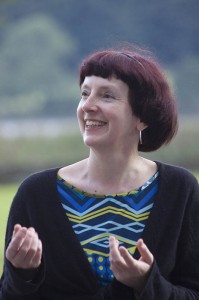
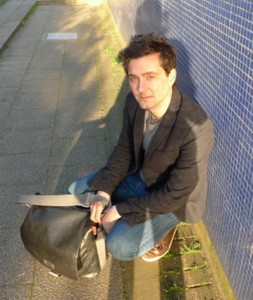
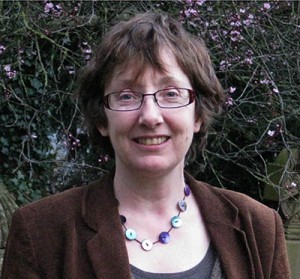
![PicWeb_Norfolk_AlisonFalconer[1]](http://cafewriters.co.uk/wp-content/uploads/2013/11/PicWeb_Norfolk_AlisonFalconer1-295x300.jpg)
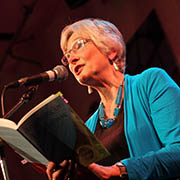
![PicWeb_Commendx2_AdrianBlackledge[1]](http://cafewriters.co.uk/wp-content/uploads/2013/11/PicWeb_Commendx2_AdrianBlackledge1.jpg)
